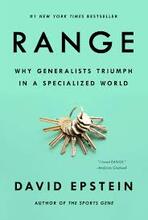 I heard from Ryan Holiday about the book Range: Why Generalists Triumph in a Specialized World by David Epstein. In his final Reading List Email of 2019, he said it was the book he had recommended to the most people this year. (He also said it doubled as a valuable parenting resource.) The book's focus is all the ways that generalists, or people with skills and knowledge across multiple domains, can often be even more effective in a dynamic, fast-changing, specialized world. It also explains the benefits of tinkering, experimenting, and "active openmindedness" in science, technology, and innovation/creativity in general. I've often considered myself more of a jack of many trades than a master of any single one, and this book makes me feel a little better about myself. You have to be deep enough in a domain to understand it and be effective, but it's often at the intersections and interfaces between domains (where generalists often hang out) where innovation and creativity usually occurs. As a parent, I learned that there is huge value for kids in early experimentation and sampling of many different things (musical instruments, sports, etc.) before later specialization. Early specialization can yield remarkable results, but later specialization is usually much better overall for many reasons the book discusses. My main notes and takeaways on the book are below. Intro: Roger Federer (generalization) vs. tiger woods (specialization)
Theory of deliberate practice Sampling period early then specialize much later 1 cult of head start Are chess and golf exceptions or the rule Kind or wicked learning environments. Some confirm to patterns and rules and others don’t. Chunking Cognitive entrenchment if get too specialized Need to have broad interests to get better 2 how the wicked world was made Exposure to modern world increases ability to deal with complexity Fermi estimation problems 3 when less of the same is more Better to learn multiple musical instruments and let kid choose which Many jazz musicians improvise and don’t know how to read music 4 learning fast and slow Making connections problems in class versus following procedures and rules Fast and easy learning not as good Make it hard Desirable difficulties Generation effect: force kid to generate answers Retrieval and learning is all about the journey Deliberate spacing between practice sessions Space between practice sessions makes learning hard which helps the learning Repetition less important than struggle Doing poorly now essential for long term performance Interleaving. Varied/mixed practice. Shuffle flash cards of different problem types. 5 thinking outside experience Analogically Thinking Avoiding dangers of the inside view Look outside for other similar analogies Analogizing widely 6 trouble with too much grit Match quality of job to person 7 flirting with your possible selves Meandering career paths are the norm Short term planners not long term visionaries Formulate long term goals after period of discovery Context principle: context affects your personality Personality continues to evolve Do many experiments Test and learn, not plan and implement Trying things is how you find your talent and passion 8 outsider advantage Local search versus new ideas 9 lateral thinking with withered technology Be producer not engineer Key is adjacent stuff Polymaths 10 fooled by expertise Breadth better than depth for forecasting Foxes versus hedgehogs Use experts for facts not opinions or predictions Best forecasters flip flop like crazy Good judgment project IARPA Active openmindedness and trying to falsify own notions Accepting and seeking out contrary ideas Not what you think but how you think Writing down in notes every idea you encounter contrary to your own Look for outside examples of structurally related events 11 learning to drop familiar tools Is this the data we really want to rely on? Do we need more data? Professionals sometimes need to drop their tools when in uncharted territory Congruence model: sometimes need to use different frameworks. Need to have range. 12 deliberate amateurs Conclusion: expanding your range
0 Comments
Your comment will be posted after it is approved.
Leave a Reply. |
Archives
June 2024
Categories
All
Subscribe |
 RSS Feed
RSS Feed
